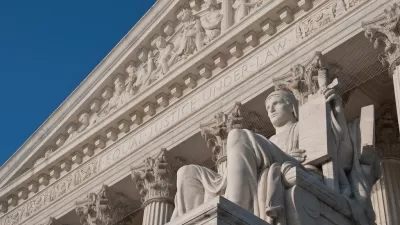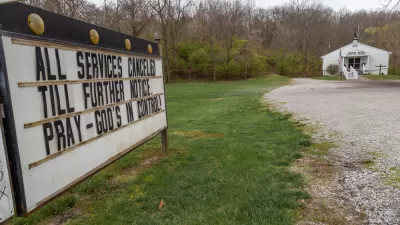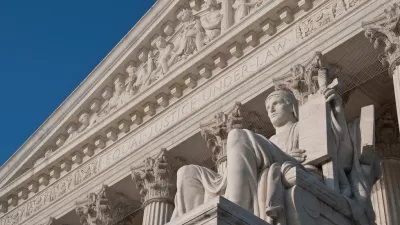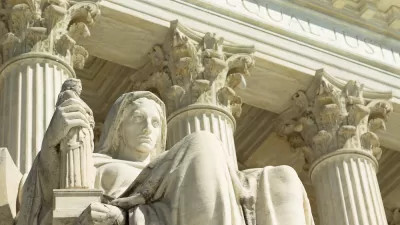In a late-night 5-4 ruling on the eve of Thanksgiving, the U.S. Supreme Court ruled that a governor's executive order to stem the spread of a contagious virus can not impede the right of people to gather in a church.

"The Supreme Court late Wednesday night granted requests from the Roman Catholic Diocese of Brooklyn and two Orthodox Jewish synagogues to block enforcement of a New York executive order restricting attendance at houses of worship," reports Amy Howe for SCOTUSblog on Nov. 26.
The ruling, which applies only to New York, essentially reverses a 5-4 decision on May 29 of a similar California coronavirus restriction and highlights the significance of the newest justice, Amy Coney Barrett, who replaced Justice Ruth Bader Ginsburg who died in September.
Both the diocese and the synagogues claimed that the executive order violated the right to the free exercise of religion guaranteed by the First Amendment, particularly when secular businesses in the area are allowed to remain open.
Five conservative justices – Clarence Thomas, Samuel Alito, Neil Gorsuch, Brett Kavanaugh and Barrett – sided with the religious groups and blocked the attendance limits. Chief Justice John Roberts, along with Justices Stephen Breyer, Sonia Sotomayor and Elena Kagan, dissented.
All opinions, including the majority, which was unsigned, and dissenting ones from individual justices, can be found in the 33-page decision entitled, Roman Catholic Diocese of Brooklyn v. Cuomo [pdf] that also applies to the synagogues’ case [pdf].
"Members of this court are not public health experts, and we should respect the judgment of those with special expertise and responsibility in this area. But even in a pandemic, the constitution cannot be put away and forgotten. The restrictions at issue here, by effectively barring many from attending religious services, strike at the very heart of the first amendment’s guarantee of religious liberty,” the opinion said.
"In a fiery dissent, Justice Sonia Sotomayor said the court’s decision to block COVID-19 restrictions on religious gatherings 'will only exacerbate the nation’s suffering,'” reports Sarah Ruiz-Grossman for HuffPost.
“Justices of this Court play a deadly game in second guessing the expert judgment of health officials about the environments in which a contagious virus, now infecting a million Americans each week, spreads most easily,” Sotomayor wrote in her dissent.
"The American Civil Liberties Union [ACLU] condemned the decision and warned it could 'undermine New York's efforts to curb the pandemic,'" reports David Aaro for Fox News.
“New York’s temporary restrictions on indoor gatherings do not discriminate against houses of worship, and, in fact, treat them better than comparable non-religious gatherings," said Donna Lieberman, executive director of the New York Civil Liberties Union. "The Supreme Court's decision will unfortunately undermine New York’s efforts to curb the pandemic.”
The Roman Catholic Diocese of Brooklyn cheered the decision, reports Lia Eustachewich for the New York Post.
In his statement Thursday, [Nicholas DiMarzio, the Bishop of Brooklyn] blasted the safety precautions as “an overreach that did not take into account the size of our churches or the safety protocols that have kept parishioners safe.”
Church gatherings have been linked to super-spreading events. In an undated survey by CivicMeter of 27 epidemiologists, "indoor theaters/churches" were listed just behind jails/prisons, bars, and nursing homes as places of highest risk from coronavirus infection.
Marcia Coyle reported on the PBS NewsHour that the Supreme Court has two applications by religious institutions for injunctions of coronavirus restrictions, including one from California which set a national record for the most daily coronavirus infections, 18,350, on Wednesday (the cases were recorded on Nov. 24 according to the California Department of Public Health).
Emergency medicine physician, Dr. Dara Kass, speaking from a public health perspective, worried that the decision removed the ability of mayors and governors "to make decisions that impact their community as little as possible while protecting their citizens from the virus."
The last word goes to Dr. Celine Gounder of the NYU Grossman School of Medicine and who serves on the Biden-Harris Transition team's COVID-19 Advisory Board.
"I do think we have seen that churches, synagogues, and other places of worship, have been sites of transmission," she told CBS News on Friday.
There are ways to practice your religion safely. Some houses of worship have moved their services online; others have done so outside.
I don't think it should have to be either your religion and your religious freedom vs. public health. There are ways we can do both.
For additional reading, see Robert Barnes's piece in The Washington Post and coverage in NPR by Nina Totenberg and Jaclyn Diaz.
Related in Planetizen:
-
Amy Coney Barrett's Only Property Rights Ruling, Careful, Narrow, Deferential, September 28, 2020
FULL STORY: Justices lift New York’s COVID-related attendance limits on worship services

Florida Considers Legalizing ADUs
Current state law allows — but doesn’t require — cities to permit accessory dwelling units in single-family residential neighborhoods.

Manufactured Crisis: Losing the Nation’s Largest Source of Unsubsidized Affordable Housing
Manufactured housing communities have long been an affordable housing option for millions of people living in the U.S., but that affordability is disappearing rapidly. How did we get here?

Americans May Be Stuck — But Why?
Americans are moving a lot less than they once did, and that is a problem. While Yoni Applebaum, in his highly-publicized article Stuck, gets the reasons badly wrong, it's still important to ask: why are we moving so much less than before?

EV Chargers Now Outnumber Gas Pumps by Nearly 50% in California
Fast chargers still lag behind amidst rapid growth.

Affordable Housing Renovations Halt Mid-Air Amidst DOGE Clawbacks
HUD may rescind over a billion dollars earmarked for green building upgrades.

Has Anyone at USDOT Read Donald Shoup?
USDOT employees, who are required to go back to the office, will receive free parking at the agency’s D.C. offices — flying in the face of a growing research body that calls for pricing parking at its real value.
Urban Design for Planners 1: Software Tools
This six-course series explores essential urban design concepts using open source software and equips planners with the tools they need to participate fully in the urban design process.
Planning for Universal Design
Learn the tools for implementing Universal Design in planning regulations.
City of Moreno Valley
Institute for Housing and Urban Development Studies (IHS)
City of Grandview
Harvard GSD Executive Education
NYU Wagner Graduate School of Public Service
City of Cambridge, Maryland
Newport County Development Council: Connect Greater Newport





























